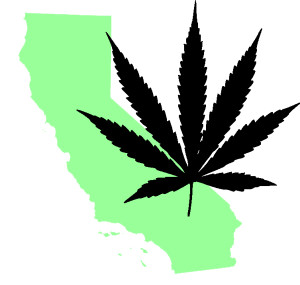 Years before U.S. states began legalizing recreational marijuana, many people were arguing that the government should legalize marijuana and then tax and regulate it. The government would then be able to bring in heaps of cash. Their argument was that this would also be beneficial to the legal marijuana industry. It would suffocate the illicit market, and people would buy the legal product because the product sells itself.
Years before U.S. states began legalizing recreational marijuana, many people were arguing that the government should legalize marijuana and then tax and regulate it. The government would then be able to bring in heaps of cash. Their argument was that this would also be beneficial to the legal marijuana industry. It would suffocate the illicit market, and people would buy the legal product because the product sells itself.
For California, things have not quite turned out this way. There are many people still buying cannabis on the illicit market, due to steep markups and high taxes on legal shops. Local restrictions have also complicated things, according to survey data recently released from marijuana delivery service Eaze.
“Unlicensed retailers do not have to comply with worker protection laws, test products for pesticides and processing chemicals, or remit taxes,” said a report from the company outlining the findings. “That results in a large pricing benefit.”
The biggest takeaway from the survey was the difficulties of selling legal marijuana in the state, despite California representing the world’s biggest recreational marijuana market. According to Eaze’s results, one in five Californians has bought marijuana from the illicit market (encompasses anything from street sales to shops that don’t have their paperwork together) in the past three months.
Further, 84 percent of those customers are “highly likely” to go back to buying from a seller without a license. Why? People go back to buying from a seller without a license due to “the illicit market having cheaper products and no tax”, explains Eaze. In addition, 17 percent chose an unlicensed source “due to local laws that restricted access to legal cannabis”.
Will Cutting Taxes Provide Relief for Legal Marijuana Industry?
The data also suggests that a 5 percent cut in the overall tax rate in California could draw up to 23 percent of customers buying marijuana from unlicensed sellers into the legal market. Even more encouraging, 84 percent of Californians say they are actually “very satisfied” with the legal market. As far as consumers’ complaints with the legal marijuana business overall, the survey shows that:
- 47 percent are dissatisfied with excessively high taxes (the most frequent issue)
- 36 percent cited a lack of electronic payment options
- And 32 percent listed “overpriced” products
Solution for the Legal Marijuana Industry
To help the legal marijuana industry address the second most cited issue, alternative lenders have been helping these business owners offer a wider range of payment options. Because marijuana is still very much illegal at the federal level, banks fear prosecution if they offer their services to the industry. High-risk processors like Marijuana Merchant Account have stepped in to offer electronic payment options.
As the industry continues to sort itself out – federal government, taxes, regulations – businesses can at least address one of the biggest issues. Offering safe, electronic payment processing ensures your legal marijuana business can offer a seamless and convenient customer experience.


 California has successfully circumvented federal law and created a state-held bank with the purpose of serving the marijuana industry. While many are excited that these plans have moved from words to actions, others are questioning how viable it is. This has led state Treasurer John Chiang and state Attorney General Xavier Becerra to launch a new feasibility study. Chiang’s department will be focusing on the financial and operational issues, while Becerra is examining the legal.
California has successfully circumvented federal law and created a state-held bank with the purpose of serving the marijuana industry. While many are excited that these plans have moved from words to actions, others are questioning how viable it is. This has led state Treasurer John Chiang and state Attorney General Xavier Becerra to launch a new feasibility study. Chiang’s department will be focusing on the financial and operational issues, while Becerra is examining the legal. Industry experts recently shared that California will become the largest recreational cannabis market in the world and the largest creator of jobs for marijuana. Not only is California going to be the largest market, but it is also the ideal location for growers, processors and sellers. For those looking for work in this booming market, growers, processors and sellers are not the only businesses that will be hiring; adjacent services (legal advice, marketing, security, etc.) will be seeking additional staff as well.
Industry experts recently shared that California will become the largest recreational cannabis market in the world and the largest creator of jobs for marijuana. Not only is California going to be the largest market, but it is also the ideal location for growers, processors and sellers. For those looking for work in this booming market, growers, processors and sellers are not the only businesses that will be hiring; adjacent services (legal advice, marketing, security, etc.) will be seeking additional staff as well. California constituents unanimously voted in favor of the Adult Use of Marijuana Act (AUMA), famous as Proposition 64 eventually becoming the 5th state to decriminalize recreational pot after Colorado, Washington DC, Oregon and Alaska. It also shouldn’t be forgotten that California was the first state to legalize medicinal cannabis and currently, (and it has been so from January 1, 2018), you can freely smoke your pot in marijuana as long as your use your weed within the law.
California constituents unanimously voted in favor of the Adult Use of Marijuana Act (AUMA), famous as Proposition 64 eventually becoming the 5th state to decriminalize recreational pot after Colorado, Washington DC, Oregon and Alaska. It also shouldn’t be forgotten that California was the first state to legalize medicinal cannabis and currently, (and it has been so from January 1, 2018), you can freely smoke your pot in marijuana as long as your use your weed within the law. Marijuana decriminalization is now one of the hottest topics in California and the whole of U.S. On Jan. 1, California celebrated the legalization of weed for all over 21s and joined Colorado in the list of ‘high states.’
Marijuana decriminalization is now one of the hottest topics in California and the whole of U.S. On Jan. 1, California celebrated the legalization of weed for all over 21s and joined Colorado in the list of ‘high states.’
 Even if Jeff Session’s won’t give up his battle against decriminalization of recreational cannabis, at least the year set off with some good news for California. As of January 1, the state had legalized marijuana. Currently adults, 21 and above, can lawfully
Even if Jeff Session’s won’t give up his battle against decriminalization of recreational cannabis, at least the year set off with some good news for California. As of January 1, the state had legalized marijuana. Currently adults, 21 and above, can lawfully  Even in the excitement of legal recreational marijuana sales rolling out in California on January 1s t, a very big problem remains: the lack of financial services. The ability for consumers to consume recreational cannabis in
Even in the excitement of legal recreational marijuana sales rolling out in California on January 1s t, a very big problem remains: the lack of financial services. The ability for consumers to consume recreational cannabis in  A Denver-based company, Organa Brands, has created the first-ever public services announcement in airport terminals concerning cannabis. One of the largest legal cannabis brands in the country, Organa Brands premiered their ad campaign last month on branded trays at security checkpoints of a major airport in Southern California. The goal of this campaign is to remind passengers about the serious legal repercussions involved in taking cannabis aboard a plane. The PSA reads, “Cannabis is legal, traveling with it is not. Leave in California.”
A Denver-based company, Organa Brands, has created the first-ever public services announcement in airport terminals concerning cannabis. One of the largest legal cannabis brands in the country, Organa Brands premiered their ad campaign last month on branded trays at security checkpoints of a major airport in Southern California. The goal of this campaign is to remind passengers about the serious legal repercussions involved in taking cannabis aboard a plane. The PSA reads, “Cannabis is legal, traveling with it is not. Leave in California.”